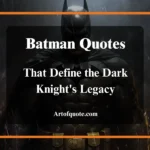Charles Dickens is one of the most celebrated authors in English literature, known for his insightful commentary on society and masterful storytelling. Charles Dickens quotes about writing offer valuable lessons for writers and readers alike. Through his works, he explored themes of social justice, human nature, and personal redemption. Many of his quotes inspire not only literary enthusiasts but also anyone seeking motivation and perspective. In this article, we will explore some of Dickens’ most memorable quotes, focusing on his thoughts about writing and the craft that made him a literary icon.
Inside This Post:
Charles Dickens Quotes
It was the best of times, it was the worst of times.
– Charles Dickens
Explanation: This famous line from A Tale of Two Cities is a reflection on the duality of human experience—how joy and sorrow can coexist in a moment.
“There is nothing in the world so irresistibly contagious as laughter and good humor.”
– Charles Dickens
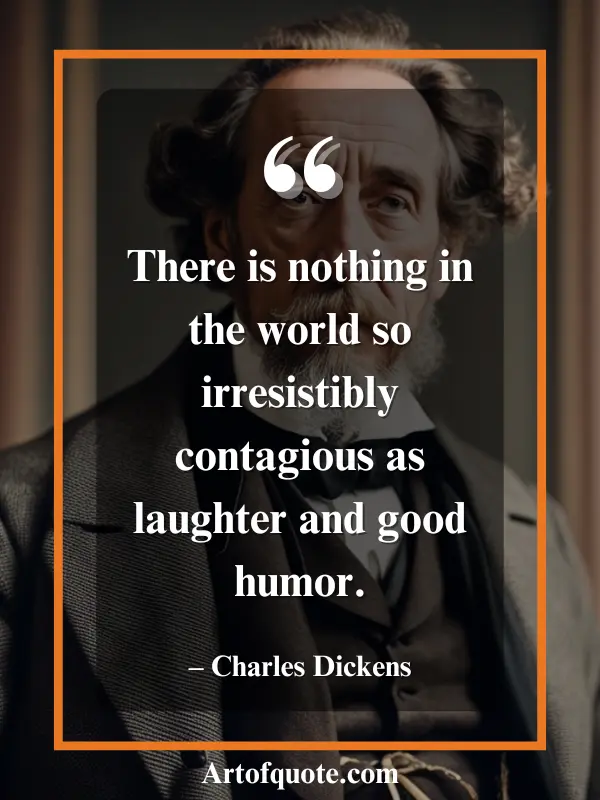
Explanation: Dickens highlights the power of laughter as a force that can uplift and spread positivity, even in the darkest times.
A loving heart is the truest wisdom. – Charles Dickens
Explanation: Dickens reminds us that love is the foundation of wisdom, suggesting that our capacity for love is the key to navigating life’s complexities.
Charles Dickens Quotes on Christmas
God bless us, every one! – Charles Dickens
Explanation: This famous line from A Christmas Carol expresses a heartfelt blessing and goodwill to all, encapsulating the Christmas spirit of kindness and compassion.
“I will honor Christmas in my heart, and try to keep it all the year.”
– Charles Dickens
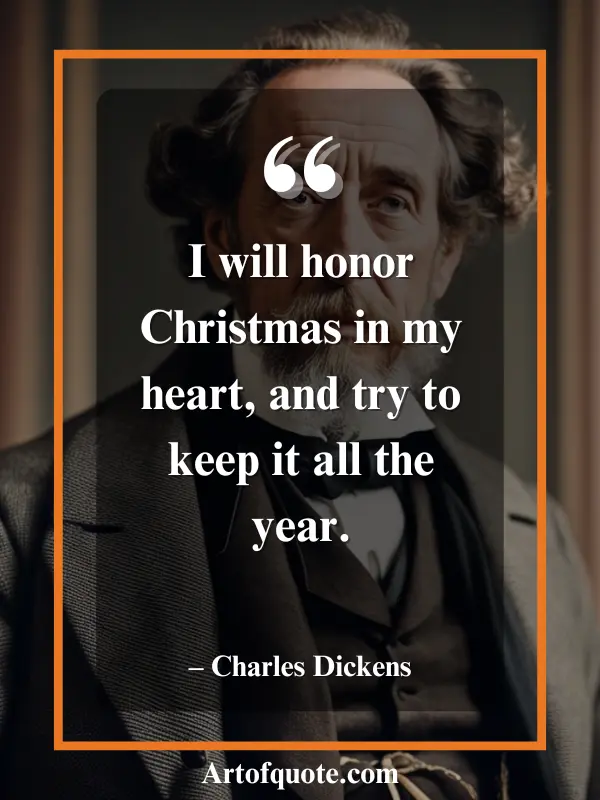
Explanation: Scrooge’s transformation in A Christmas Carol teaches us that the lessons of Christmas—generosity and compassion—should extend beyond just one day.
No one is useless in this world who lightens the burdens of another. – Charles Dickens
Explanation: This quote emphasizes the Christmas virtue of helping others, reminding us that kindness is never wasted.
Other Article: Best Jan Levinson Quotes: Wisdom from The Office
Famous Charles Dickens Quotes
The pain of parting is nothing to the joy of meeting again. To be in the midst of the– Charles Dickens
Explanation: Dickens speaks to the power of reunion and the profound joy that comes from reuniting with loved ones after time apart.
“It is a melancholy truth that even great men have their poor relations.”
– Charles Dickens
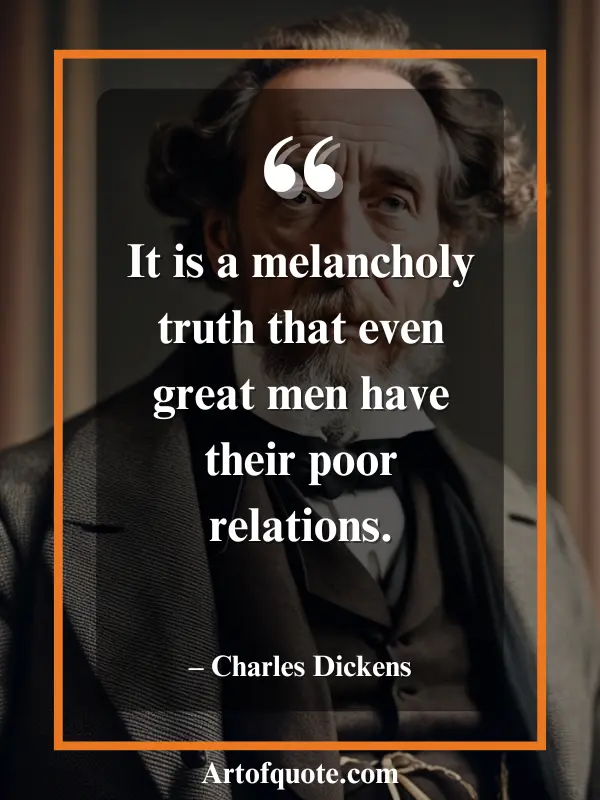
Explanation: Dickens often explored themes of social inequality, and this quote highlights the sometimes painful contrast between wealth and poverty in society.
There is a wisdom of the head, and there is a wisdom of the heart. – Charles Dickens
Explanation: This reflects Dickens’ belief in the balance between intellect and emotional wisdom, both of which are essential in understanding the world.
Charles Dickens Quotes on Love
Love is the golden thread that ties the heart of all the world. – Charles Dickens
Explanation: This quote underscores Dickens’ belief that love connects all of humanity, acting as a bond that unites us regardless of differences.
“It is not a slight thing when they, who are so fresh from God, love us.”
– Charles Dickens
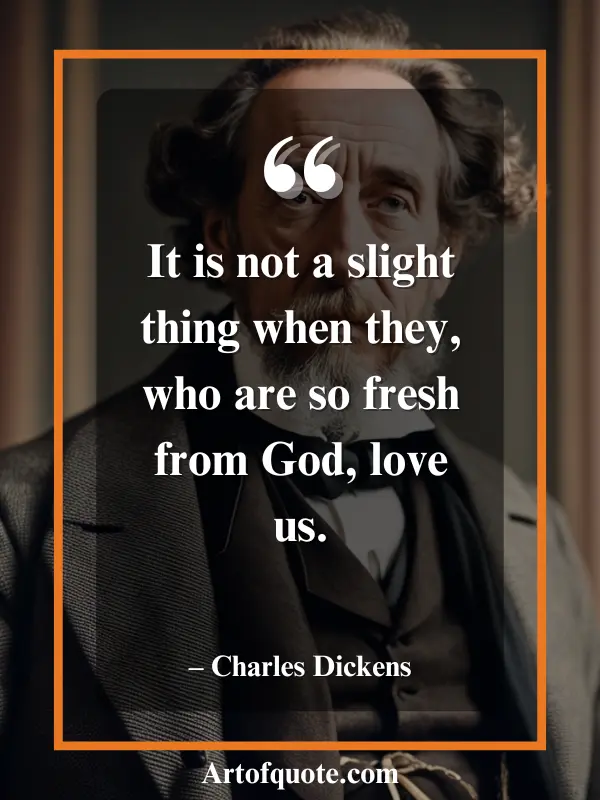
Explanation: Dickens reflects on the purity and innocence of a child’s love, portraying it as a divine gift that should not be taken lightly.
There is no greater mistake than to make the character of the heart the standard for the character of the mind.
– Charles Dickens
Explanation: Dickens warns against judging a person’s intelligence based on emotional behavior, suggesting that love should not overshadow rational thinking.
Charles Dickens Quotes Christmas Carol
Scrooge was better than his word. He did it all, and infinitely more. – Charles Dickens
Explanation: This line reflects the true transformation of Ebenezer Scrooge, who exceeds expectations after his redemption, becoming a symbol of generosity and change.
“Are there no prisons? Are there no workhouses?”
– Charles Dickens
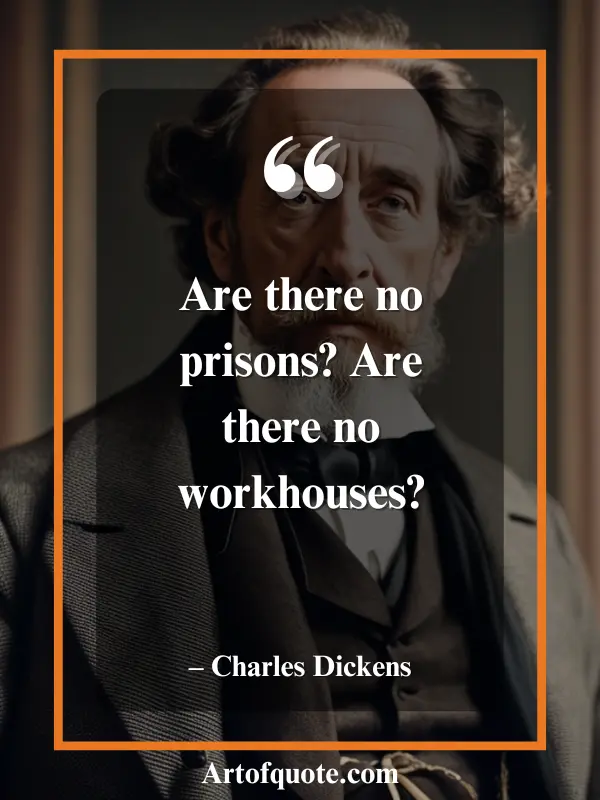
Explanation: This harsh question, asked by Scrooge in A Christmas Carol, critiques the indifference of the wealthy towards the suffering of the poor.
I wear the chain I forged in life. – Charles Dickens
Explanation: This quote from Marley’s ghost symbolizes the consequences of a life lived without compassion, emphasizing the importance of moral choices.
Great Expectations Charles Dickens Quotes
I have been bent and broken, but – I hope – into a better shape. – Charles Dickens
Explanation: This quote reflects the theme of personal transformation in Great Expectations, where the protagonist, Pip, learns from his struggles and grows into a better person.
“You are in every way the best and the worst of the people I know.”
– Charles Dickens

Explanation: Dickens explores the duality of human nature in Great Expectations, capturing the internal conflict of complex characters.
To be in the midst of the highest and the lowest of society is to know the depth of human experience.
– Charles Dickens
Explanation: This speaks to the class struggles explored in Great Expectations, emphasizing the extremes of human experience in both wealth and poverty.
Charles Dickens Quotes on Life
Life is made of ever so many partings welded together.
– Charles Dickens
Explanation: This quote speaks to the inevitable separations we face in life, yet how these separations form part of the human experience.
“The most important thing in life is not what we do, but who we are.”
– Charles Dickens
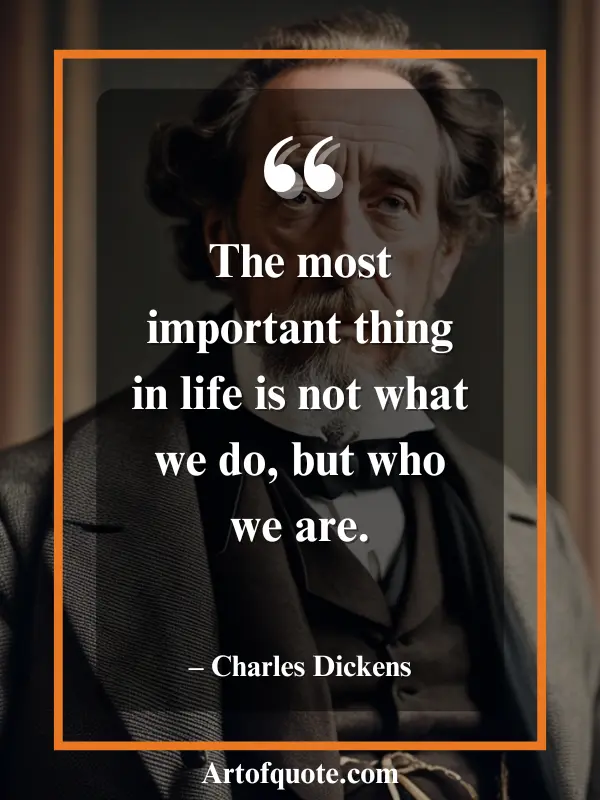
Explanation: Dickens emphasizes that our actions are secondary to our character and how we choose to live our lives.
A day wasted on others is not wasted on oneself.
– Charles Dickens
Explanation: This quote reflects Dickens’ belief in the importance of selflessness, suggesting that giving to others enriches our own lives.
Charles Dickens Quotes About Cats
What greater gift than the love of a cat? – Charles Dickens
Explanation: Dickens acknowledges the joy and companionship that comes from the love of animals, particularly cats.
“The cat is the only animal that has the best part of life—being pampered.”
– Charles Dickens
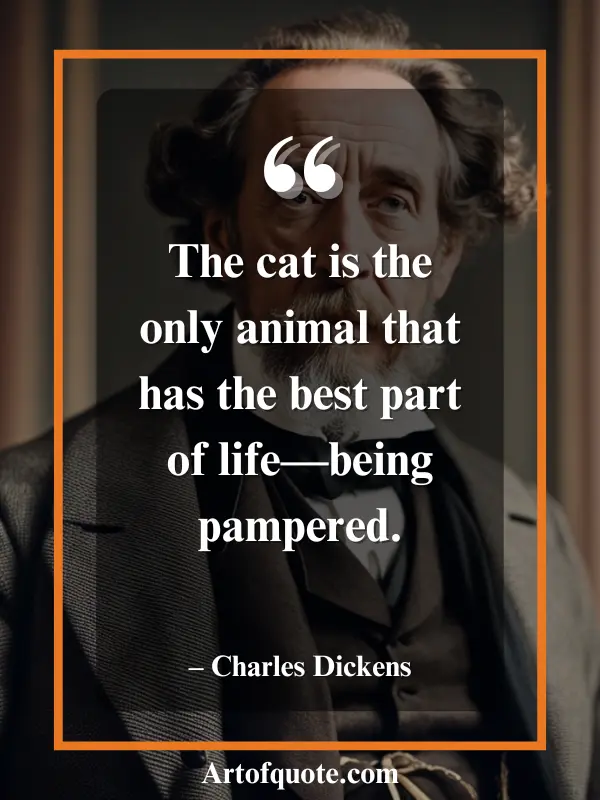
Explanation: Dickens humorously captures the lavish life that cats seem to lead, enjoying comfort and indulgence.
Cats are the ultimate family members. They show us unconditional love and teach us to be patient.
– Charles Dickens
Explanation: This quote highlights the emotional connection between humans and cats, emphasizing their role as loving and patient companions.
Charles Dickens Quotes It Was the Best of Times
It was a time of joy, a time of sorrow, a time of hope, a time of despair. – Charles Dickens
Explanation: Dickens captures the contrasting emotions of a tumultuous era, emphasizing the complexity of the human condition.
“There were a king with a large jaw and a queen with a fair face, on the throne of England; there were a king with a large jaw and a queen with a fair face, on the throne of France.”
– Charles Dickens
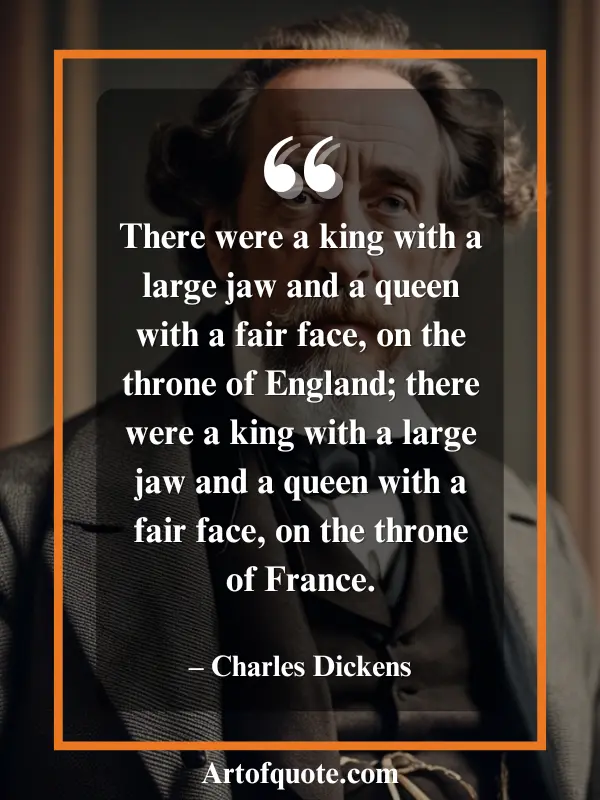
Explanation: A famous line from A Tale of Two Cities, illustrating the symmetry of the two monarchies during the French Revolution.
The period was so far like the present period, that some of its noisiest authorities insisted on its being received, for good or for evil, in the superlative degree of comparison only. – Charles Dickens
Explanation: This line reflects Dickens’ satirical view of the times, pointing out how those in power often demand absolute agreement.
A Tale of Two Cities Quotes
It is a far, far better thing that I do, than I have ever done. – Charles Dickens
Explanation: This famous quote from A Tale of Two Cities speaks to the idea of redemption and sacrifice for the greater good.
“I am the resurrection and the life.”
– Charles Dickens
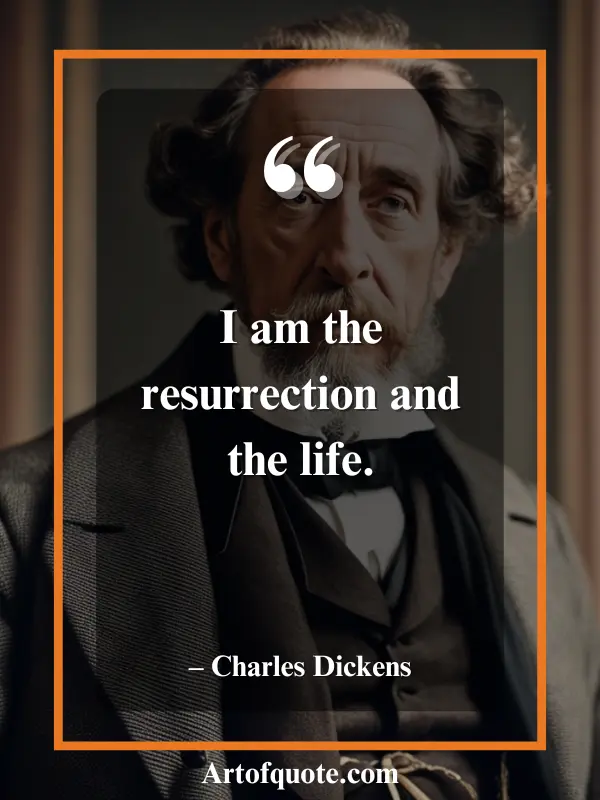
Explanation: Dickens uses religious imagery to emphasize themes of sacrifice and redemption in A Tale of Two Cities.
The world is a better place for having you in it.
– Charles Dickens
Explanation: This quote speaks to the positive impact we can have on the world, often echoing the theme of selfless sacrifice in Dickens’ works.
FAQs
One of Charles Dickens’ most famous quotes is: “It was the best of times, it was the worst of times.” This iconic opening line from A Tale of Two Cities captures the contrasts of life and remains one of the most recognizable literary quotes.
Charles Dickens has many famous quotes, such as “The pain of parting is nothing to the joy of meeting again” and “No one is useless in this world who lightens the burdens of another. His quotes often reflect themes of compassion, social justice, and human resilience.
The most popular quote attributed to Charles Dickens is: “It was the best of times, it was the worst of times.” This line is widely recognized as the powerful opening to A Tale of Two Cities, symbolizing the contrasts and turmoil of the era.
A famous quote from Great Expectations is: “I only ask to be free. The butterflies are free.” This line highlights the theme of personal freedom and the desire for a better life, which is central to the novel.
Conclusion:
Charles Dickens’ quotes about writing continue to inspire and guide generations of readers and writers. His unique ability to blend humor, social critique, and human empathy in his writing remains a cornerstone of his enduring legacy. Whether you’re an aspiring writer or simply someone looking for thoughtful words, Dickens’ insights on writing provide timeless wisdom. As you reflect on these famous Dickens quotes, consider how they apply to your own life and writing journey.
For a deeper dive into Dickens’ work, you can visit this detailed collection of Dickens quotes.
- Superman Quotes: Inspirational Words from the Man of Steel - December 22, 2024
- 30 Famous Charles Dickens Quotes About Writing, Life, Love & More - December 20, 2024
- C.S. Lewis Quotes on Love, Friendship, Faith, and Life to Inspire You - December 19, 2024




